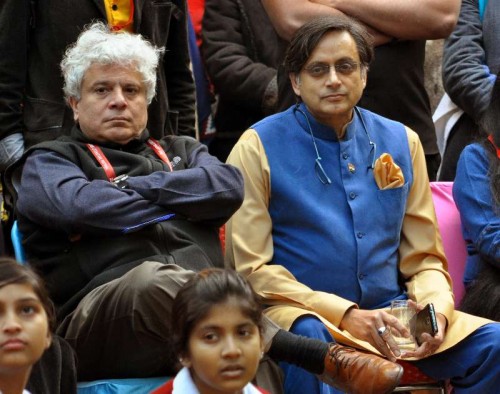
By Shilpa Raina
does society have a biased view about writers dealing with sex or about sexual dualities, what would end if we stop believing in our past and why freedom of expression comes at a cost were among the questions that were thrown open for debate and introspection at the Jaipur Literature Festival 2015.
The annual literary fest, which has attained the stature of a “literary pilgrimage” for the bibliophile, was held as usual at the 17th century Diggi Palace. It hosted 234 speakers from all around the globe who initiated stimulating discussions on varied themes ranging from history, politics, cinema, art, travel and poetry across 170 sessions on its five days ending Sunday.
As the festival, now in its eighth edition, has grown from strength to strength since its inception 2006, when it began on a small scale as part of the Jaipur Heritage International Festival, the organisers tried to include dynamic topics in several sessions that could lead to engaging and illuminating conversations.
This year was no different with Pulitzer Prize-winning poet Vijay Seshadri at the very onset raising strong concerns about the freedom of literary imagination. “The issue of the poetic imagination, of its scope and freedom, has become doubly fearsome, and has become problematic because of the way Indian society is developing,” he said in his keynote address on the opening day.
Similarly lyricist Prasoon Joshi chose to initiate debate on the Tamil writer Perumal Murugan’s decision to renounce writing following protests from various organizations in the session that was to discuss “”Is the Commerce of Literature Today Killing Good Writing?”.
And all the panelists were unamimous that the “burning of the book is act of violence”.
Nobel Prize-winning author V.S.Naipul was also present to mark 50 years of the publication of his “A House for Mr. Biswas” that has now acquired the status of a classic. The 82-year-old, now on a wheel-chair, was moved to tears after he received overwhelming response from people as he was brought onto the stage.
Other interesting sessions that touched upon the subject of “writing on sex and refiguring masculinity” saw the panelists asking pertinent questions to the audience for “building stereotypes about these topics” and viewing them with a myopic outlook.
Adding to the event’s appeal was discussions on contemporary issues like the situation of Pakistan, of the Middle East, the prospects of Israeli-Palstinian peace process, and India’s watershed 2014 elections.
For history buffs, there were intriguing facets and episodes like the 19th century Chinese empress who really modernised her country, a diamond necklace scandal that doomed the French monarchy, the legend of Lawrence of Arabia and the audacious kidnapping of a German general from a Greek island in the penultimate year of World War II.
Unlike some previous years, the festival managed to stay away from any controversy and distinguished participants like Congress MP Shashi Tharoor, who attended several sessions, faced questions only on books politics, not the investigation into the murder of his wife Sunanda Pushkar .
As usual, Bollywood made its presence felt at the festival as prominent personalities Naseeruddin Shah, Waheeda Rahman, Javed Akhtar and Shabana Azmi participated in several sessions. In one memorable session, Shabana, daughter of iconic poet Kaifi Azmi, teamed with Salima Hashmi, daughter of equally iconic Faiz Ahmed Faiz, to discussed their illustrious fathers.
Literary luminaries like father of modern travel writing Paul Theroux, 2013 Man Booker Prize winner Eleanor Catton, Samuel Johnson Prize winner and author of “The Suspicions of Mr. Whicher” Kate Summerscale, Pakistani painter, writer and academic Hashmi, Pulitzer Prize-winning historian and journalist Kai Bird and the author of “Family Life” Akhil Sharma also attended the festival.
The festival as usual drew huge crowds, especially in its last two days, but sometimes this led to swamping of available space – especially where the venue was smaller – and created near chaos. It was a moot point how much some of people thronging the venue attended even one session or were interested in one, given that many walked out midway and the organisers must give this aspect some thought.